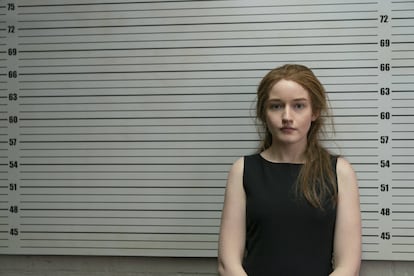Anna Delvey, the con artist who swindled Manhattan’s elite by posing as a German heiress
Netflix has just premiered ‘Inventing Anna,’ a show based on the real-life story of a woman who racked up over $200,000 in unpaid bills and is now fighting deportation

The premiere of Inventing Anna, a Netflix show by Shonda Rhimes, caught Anna Delvey (whose real name is Anna Sorokin) in jail, or more accurately, in the custody of Immigration and Customs Enforcement (ICE) for overstaying her visa.
Before that she did time in as many as five penitentiaries to serve a sentence for grand larceny and theft of services, including at the infamous Rikers Island correctional facility in New York, which shows up in the streaming series. “You’re wearing a blue jumpsuit,” notes the reporter who goes to see her, after being informed by Delvey that her clothes are awful. Delvey coolly replies that she has her prison jumpsuit pressed and that she accessorizes it.
Although the series is not 100% true to reality, this dialogue sounds a lot like the real ones that Delvey has had with journalists in the past. At the end of her trial, she told a reporter for The New York Times: “The thing is... I’m not sorry.” And when a BBC reporter asked her whether crime pays, she replied yes, literally. That’s because Netflix paid her $320,000 (€282,000) for her life rights to the series. Delvey spent around $200,000 (€176,000) to repay her debts and the rest to pay her legal fees.
In financial terms, Delvey may well be the least ambitious of all the millenial swindlers who emerged in the last decade, and whose stories are now flooding commercial fiction. Elizabeth Holmes, the founder of Theranos (there are two projects in the works about her, added to an existing docuseries and podcasts) extracted a lot more money from investors with her unicorn company specializing in blood analysis that was full of hot air, and Rebekah Neumann lost as much as $100 million (€88 million) a week at WeWork, the company she co-founded with her husband Adam Neumann. Her story will soon be told by HBO with actress Anne Hathaway in the lead role.
Delvey’s con game seems almost modest by comparison, but her story is beguiling because of where it took place, among Manhattan’s elite. Audiences enjoy watching these supposedly sophisticated people getting duped, and they are also taken in by Delvey’s own complete lack of self-judgment and unlimited capacity for lying. Even during her trial she continued to promote herself tirelessly. She hired a stylist, Anastasia Walker, to help her with her look at the hearings, and together the pair opened up an Instagram account to show them off called Anna Delvey Court Looks. Many of these outfits have been carefully reproduced in the Netflix series.

Delvey was sentenced to four to 12 years in prison for failing to pay bills worth $200,000. The list of creditors includes hotels and a private airline. But the con artist was arrested before she could complete a more ambitious project: securing $25 million (€22 million) from an investment fund to set up a private art club with branches in Hong Kong, Los Angeles, Dubai and Manhattan. The venture was going to be called, with characteristic modesty, the Anna Delvey Foundation, and she came really close to making it happen.
Her system was a classic con. In order for people to give you money, you have to look like you already have it. Swindling requires a certain amount of investment. At 11 Howard, the luxury boutique hotel where she stayed for months (and left without paying), all the employees would fight to be the one to bring up her parcels, because she always left $100 (€88) tips.
Delvey (she insists that this was her mother’s maiden name, although her parents have denied it) arrived in New York in 2016. She had no degree, no friends and no money. Her only known experience was an internship at a Paris magazine called Purple, where she made her first important contact, magazine editor Oliver Zahm, a staple of VIP parties at Coachella, Art Basel, Ibiza, Frieze and the Soho Houses across the world. That is when she began to infiltrate the scene and do odd things that she would not yet get into trouble for. She would ask people to pay for her trips or taxi rides and forget to pay them back. She left unpaid bills wherever she went and stayed at people’s houses for free. She told everyone that she was the daughter of a German entrepreneur, and she became known as the German heiress. In reality, she was born in Russia, where her father was a truck driver who went broke when he tried to set up a transportation company and her mother a housewife who ran a grocery store for a while.
One of her key contacts was Gabriel Calatrava, son of the Spanish architect Santiago Calatrava and manager of the family’s real estate holding. He showed her a large space on Park Avenue in Manhattan that would be perfect for her future foundation. She kept telling everyone that when she turned 25 she would be able to access her money, but that until then she needed cash.
Delvey also conned much more vulnerable people, especially young women who seemed fascinated with her lifestyle. One of these victims, Rachel Williams, went to Marrakesh with Delvey on a trip that would mark the beginning of the end for the con artist. Finding inspiration in Kim Kardashian’s Instagram account, Delvey booked a private riad at La Mamounia, a luxury hotel in the city, and ordered massages and spa services. She also freshened her wardrobe at the hotel boutique. The final bill was over €60,000 (€53,000). As usual, Delvey’s credit card did not work, and Williams used her own expense card for Vanity Fair, the magazine where she was working as a photo editor. Delvey promised she would pay her back immediately but the weeks passed and the money was never transferred.
Back from the trip, Delvey switched hotels and began staying at the Beekman, where she racked up debt of $10,000 (€8,800), but management here was less patient than at 11 Howard. After 20 days she was denied access to her room and found herself out on the street wearing Alexander Wang clothes. All her attempts at using phony checks and faking money transfers from non-existent accounts began to fail, and authorities started to close in on her over the unpaid hotel bills. Delvey fled to California, where she was arrested at the door of a club called Passages.
But she has plans for the future. As she recently told The New York Times, she is spending her time in ICE detention reading, preparing a legal defense to prevent getting deported to Germany, and thinking about producing a documentary and a podcast with her version of events. “I’m not trying to encourage people to commit crimes. I’m just trying to shed light on how I made the best out of my situation, without trying to glorify it,” she told the newspaper.
Tu suscripción se está usando en otro dispositivo
¿Quieres añadir otro usuario a tu suscripción?
Si continúas leyendo en este dispositivo, no se podrá leer en el otro.
FlechaTu suscripción se está usando en otro dispositivo y solo puedes acceder a EL PAÍS desde un dispositivo a la vez.
Si quieres compartir tu cuenta, cambia tu suscripción a la modalidad Premium, así podrás añadir otro usuario. Cada uno accederá con su propia cuenta de email, lo que os permitirá personalizar vuestra experiencia en EL PAÍS.
¿Tienes una suscripción de empresa? Accede aquí para contratar más cuentas.
En el caso de no saber quién está usando tu cuenta, te recomendamos cambiar tu contraseña aquí.
Si decides continuar compartiendo tu cuenta, este mensaje se mostrará en tu dispositivo y en el de la otra persona que está usando tu cuenta de forma indefinida, afectando a tu experiencia de lectura. Puedes consultar aquí los términos y condiciones de la suscripción digital.








































